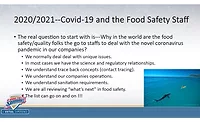The Role of Public-Private Collaborations in Global Food Safety

International trade affects everyone, especially in terms of the foods we consume and the foods we export to other countries. Global food trade has increased the amount and variety of foods offered to consumers, but has also prompted questions regarding the safety of foods grown and developed in distant lands. Consequently, food safety is a vital global public health issue. The World Health Organization estimates that contaminated foods are responsible for approximately 600 million cases of foodborne illness and 420,000 deaths per year.[1]
Food safety—or the lack thereof—can have major economic impacts for companies and countries exporting food. In fact, foodborne outbreaks are estimated to cost U.S. industry about $7 billion per year.[2] While that cost may seem steep, it doesn’t reflect the entire economic impact of an outbreak. Researchers found that foodborne pathogens impose over $15 billion in economic burden on the U.S. public each year. The negative reputation associated with food safety issues can tarnish the reputation of a food-exporting country, causing both consumers or corporate customers to lose faith in the country’s food safety system.
For example, Chinese consumers and importers of Chinese foods lost trust in China’s ability to provide safe foods in the wake of the 2008 scandal involving milk products tainted with melamine, a chemical added to milk to falsely create the appearance of higher protein quality. In this case, the milk producers took a hit and China lost credibility as a food exporter. This case and other highly public outbreaks convinced lawmakers and the food industry to make changes to our food safety systems.
Characteristics of a Robust Food Safety System
While most would agree there is a need for an effective, robust food safety system, opinions differ on what such a system should look like and who is ultimately responsible for food safety. The most effective food safety system will involve government, industry and educators in a coordinated and collaborative fashion.
A country must have a credible regulatory system for a food safety system to function properly. Proper regulatory oversight is essential to gaining the confidence of consumers and companies that choose and rely on suppliers in that country. A strong regulatory system means that the regulatory agencies have both capacity (meaning financial and human resources) and capability (meaning knowledge and skills) to properly regulate. Regulators must have the technical understanding of the science that is the foundation for good food safety practices.
Because it is the private sector that manufactures food products, they are ultimately responsible for the safety of the food. This means that the food industry must possess the knowledge and skills to develop safe food for consumers. Although the specifics may vary, the private sector’s food safety infrastructure needs are similar to those of government. However, unlike government, food companies must have the operational and technical capability to actually produce the food or ingredient in a safe manner.
Universities and educational institutions have a role to play in supporting the efforts of government and industry. Typically, academia provides research, knowledge and training that the regulators and industry rely upon to do their respective jobs.
So, let us bring all of this together. Food safety is a global issue that impacts both suppliers in one part of the world and their customers, potentially in another part of the world. However, their often-differing food safety standards and practices do not always allow for trade between the two. Food safety training for both regulators and the private sector helps facilitate business and trade. However, the expertise to provide this training may not exist locally. This is where the role of the public-private collaboration comes in.
Looking for quick answers on food safety topics?
Try Ask FSM, our new smart AI search tool.
Ask FSM →
Public-Private Collaboration
Public-private collaboration refers to bringing together the combined knowledge and specialized expertise of private industry, the government and education institutions to overcome shared challenges. Public-private partnerships create a force multiplier by bringing together the ingenuity of industry and the resources of government. Combining assets in such a way allows the partnership to bridge gaps and identify solutions to serious food safety issues.
Take for example, the Asia-Pacific Economic Cooperation (APEC) Food Safety Cooperation Forum, Partnership Training Institute Network (FSCF PTIN). This partnership was established in 2007 to engage the food industry and academic food safety experts with regulators to build capacity on food safety. The FSCF PTIN received the full endorsement of all 21 of the APEC economies’ leaders. Never before has such a collaboration been formed on a regional scale, and never before had a food safety initiative received such high-level endorsement. The FSCF PTIN shows how international public-private collaborations can be an important vehicle in sharing food safety knowledge and gaining the commitment of governments to enhancing food safety.
Public-private collaboration on food safety is essential to continue trade in food throughout the world and protecting citizens from foodborne illness. Doing so requires cooperation between the public and private sectors. In January 2018, the U.S. Trade and Development Agency (USTDA) is hosting the China Food Products Executive Training Program with a delegation including senior officials from the China Food and Drug Agency. The itinerary is designed to connect delegates with best practices including how food safety programs are implemented in the United States. The delegation will meet with leading U.S. companies to see cutting-edge solutions that can support their food safety goals back home. As part of the itinerary, USTDA will host an Industry Roundtable for U.S. businesses in Minneapolis on January 26, 2018. For further information, please visit http://phminstitute.org/cfda-food/.
1. www.who.int/foodsafety/areas_work/foodborne-diseases/ferg/en/.
2. www.ncbi.nlm.nih.gov/pmc/articles/PMC5302274/.
3. www.ers.usda.gov/publications/eib-economic-information-bulletin/eib140.
R. E. Brackett is the vice president and director of the Institute for Food Safety and Health, at the Illinois Institute of Technology and is a member of the Food Safety Magazine’s Editorial Advisory Board.






